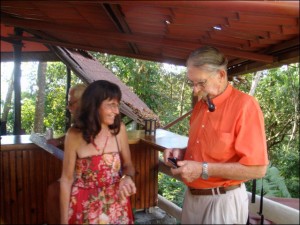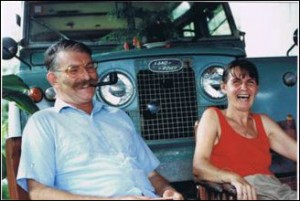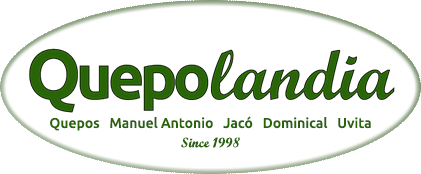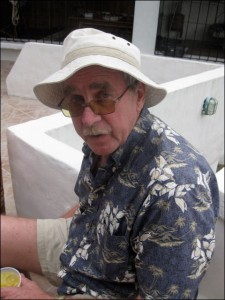The Duke and Duchess of Londres

by Steve Huffstutlar
In 1984, I was assigned to work in the dusty, smelly, broken down Pacific banana port of Quepos, which seemed to me then to be the veritable armpit of Costa Rica — it was far from being the shiny tourist paradise it is today. That year, it was my good fortune to be recruited to organize the first oil palm production cooperative in Costa Rica, thus ending the United Fruit Company/Chiquita Banana monopoly and making plantation workers into land owners.
Quepos had been in a gentle downward transition since the 1940’s, when the United Fruit Company had given up farming bananas after the Panama banana disease had somehow followed them from Limon. Oil palm took the place of the bananas, but was much less profitable and employed many fewer people. The company railroad tracks were torn out in 1970 and the first vehicle road to the outside world was built in its place.
It took years for the isolated company town to integrate into the rest of Costa Rica and diversify its economy. Back then, the old railroad yard was littered with junk. The pier was rusty and its planks were rotten. The local hospital was a leaky wooden hulk built by the Banana Company in the 30’s, as it was clearing the swamps, dealing with snakebites and malaria. The one grocery store ran out of food by the middle of Semana Santa, year after year. No eggs, no bread, no milk, no soda, no beer, nada. From April to December the nearby beach of Manuel Antonio was relatively empty, and it was not easy to find a restaurant open at night.
The humidity was as thick as the huge dust clouds on the washboard dirt roads, the sun would knock you down with its ferocity before 8 AM, and the sickly sweet, burning smell of the palm oil factories was like nothing you ever smelled before. Workers in the plantations would start at 4:15 am and stop at 10:30 am, since no sane human could work outdoors in the mid-day heat. There was seldom a breeze, Quepos being famous to sailors as the Doldrums, the place with no wind. There was only one place to sit down for lunch in the whole of Quepos town, the Bar Central, and it took close to three hours to be served. After all, nobody wanted to move about in the heat, so nobody was in a hurry.
But then about 1988 some travel writer for the New York Times called Manuel Antonio one of the five best beaches in the world, and the tourism boom was on.
I had one friend in Quepos I knew from before. Skip “Snake” Baker was obviously suffering from some tropical fever (or more likely a progressive overdose of Ron Con Coca, also known as Quepos air conditioning) that had addled his mind, because he was given to telling tall tales about nonsensical imaginary characters and places that could not possibly exist. Most likely a form of entertainment to liven up life in the dull, dusty, sweaty down-on-its-luck little company town.

For example, here is a leg-pulling tale the Snakeman told me soon after I got off the plane:
“There is a tall, mustachioed, aristocratic, pipe smoking, slightly eccentric Englishman and his drop-dead beautiful, much younger wife who live near the town of London. Their farm is not far from London Bridge, a very large, impressive steel bridge which basically goes from nowhere to nowhere. They drive a large antique Land Rover, just like the protagonists in the movie Born Free. They operate a farm where they grow exotic spices and flowers and make essential oils. They have been there since the 70s and carved the farm out of the bush when there were no roads to speak of, and they live with no phone, no television and very little contact with the outside world.”
Right, I say to myself, a sophisticated Englishman, married to a beauty who could be in the movies, living in London right by London bridge, just down this dusty road, been there since before telephones, built a spice farm out of nothing, and are content to ignore the outside world. This tall tale was obviously cribbed from some book about Sri Lanka or Kenya.
The tale got more incredible. “The Englishman and the Caribbean Beauty came to Costa Rica, like most of us, escaping from a bad situation in their former paradise. In their case it was some very small, exotic Caribbean island nation. There had been a revolution as in the movie The Year of Living Dangerously, only he had the good luck of bringing a young Sigourney Weaver with him. He had met his new young wife at the golf course, regaled her with tales of beautiful, peaceful, democratic Costa Rica, and when the revolutionaries gave outsiders 48 hours to leave the island, they grabbed a few belongings and got on the last plane out.”
I had been in Quepos a good six months and had not laid eyes on “Snake” Baker’s friends from London Bridge, and was beginning to think of that old movie with Jimmy Stewart, in which he had an invisible friend named Harvey, who happened to be a 6 foot tall talking rabbit.
Snakeman would see his friend often and it always generated new tales. Such as:
“I saw Alexander at the old hospital, where he was seeing the English-speaking Argentine exile doctor. His blood pressure was off the chart. The doctor asked him when had last seen a doctor. 1958 was the reply.”
“I saw Alexander at the bank the other day and asked him if he was a fan of television. ‘Truth to tell, I have never seen television in my life and I don’t really miss it. Bloody difficult to miss something you have never seen, old boy…..Har Har Har.’ “
” Hey, Snakeman, what is that strong perfume smell that comes wafting out of your yard into the Barbaroja grounds just after sunset?” “That’s the Ilang Ilang Perfume Tree, which opens its flowers and knocks you over with fragrance at nightfall. It was introduced to Costa Rica by Alexander, who brought it from Asia somewhere.”
By this time I had a place to live and figured, well, if I have a party and ask Snakeman to invite his friends, maybe they will show up. If Snakeman makes excuses for them, maybe they are in his imagination.
They showed up and stole the show. Snake Baker was exonerated in every detail. Alexander and Merle were better than the movies, lively and funny and perceptive, with special British and Caribbean takes on the local scene. Snakeman was my undergraduate mentor in the subjects of Costa Rica, Quepos and Tropical Human Nature, but Alexander and Merle were my graduate advisors. They are fully engaged in their community and have worked for decades to make the community better, in spite of the little rough edges in the Costa Rican political system. Alexander is, in my opinion, a world level expert on Tico Politics, Tico Business, Tico Logic and Tico Administration. These are jolly subjects in the ironic telling, even though the research and learning have been full of temporary disappointment and sordid local details. I learned from them there are few, if any, straight lines from dicho to hecho, from the written plan to the reality on the ground.
Now I tell Alexander stories nobody believes, unless they know him. He has a hand (finger? elbow? rib?) which predicts weather and earthquakes. I was present at a party at their house in around 1990 when he seriously announced “I have a strong feeling we are about to have an earthquake.” Around 15 minutes later there was a noisy, strong earthquake. We all immediately refilled our glasses with strong drink on that one.
“Pioneers” is the way to describe Alexander and Merle. Their farm is a museum of tropical agriculture with a wide variety of spices, ornamental plants and flowers. Almost every plant on their farm is a result of their pioneering innovation and adaptation of the plant to the local soil and weather. Alexander collected a wild vanilla plant near Turrialba and propagated it on his farm, and they became the pioneer vanilla growers. Merle taught neighbor women to pollinate vanilla, a tricky one-day-a-year operation. This after they had been the pioneer cinnamon, black pepper, patchouli, and allspice growers, not to mention many kinds of heliconia, trees for shade and lumber, and various flowering shrubs and palm trees.
Their neighbors who have worked on the farm learned invaluable skills, which they took back to their own small plots of land and taught other neighbors. Students, professors and researchers come to them for information and advice. The BBC has featured Alexander’s teaching on tropical agriculture, including the economic part, the bottom line. The Rockefellers and various governments spent many millions to build an agricultural research station in Turrialba in the 1940s, which has done technology transfer for small farmers on the Atlantic side. On the Pacific side, there is Alexander and Merle’s private farm.
In the culinary realm, Merle has brought West Indian delicacies and exotic, scrumptious fruit preserves to Costa Rica, and those who have tasted them are all dying for more. She is the pioneer in making and selling perfumed handicrafts and flower arrangements for the hotels.
I asked Alexander recently if they would come to visit me in San Jose. “Haven’t been to San Jose in around nine years. However we are making plans for a special trek to far-off, exotic Parrita. The vehicle inspection station is there, you know. Har har har.”
So, in short, among the many valuable things I have learned from the Duke and Duchess:
- Living close to nature is its own reward
- The natural world will let us profit from its most fragrant, delicious and beautiful bounty, but we must work very hard and be very clever and overcome high costs and byzantine local politics
- We must work with the local bureaucracy lest it work against us, and therein lies almost as much humor as frustration
- A drink and a laugh (and a little nap) in the afternoon are good for the soul
- For a long and healthy life, tend your garden and avoid doctors
- Likewise, avoid the big city, its not worth the bother and is bad for your health
- While we are re-foresting the tropics, why not plant things that are sustainable and put money in the farmers’ pockets? (Thus demonstrating the solution to the problem of how to keep poor farmers from stripping the land instead of making a living while conserving the forest)
- In addition to beautiful, fragrant flowers and delicious spices, wild colorful birds visiting on your porch and homely stray dogs will brighten things up. You must talk to your adopted, rescued dogs, give them jolly names and treat them like family.
The Duke and Duchess of Londres are real, very real.
Steven Huffstutlar wrote this lovely piece last year, and sent it off to his vast array of friends including Tekla and me, and we prevailed upon him to make it more widely available to all Queponians. Steven, a Costa Rican resident, now spends most of his time in Los Angeles de Santo Domingo de Heredia. In 1984, when he was living in Quepos, he undertook the assignment of organizing former plantation workers into the agricultural cooperative which farms oil palm on the west side of Parrita. Coopecalifornia, it’s called, and it’s been very successful. – Bill Deverell


Makes me miss C.R. even more than I do on a reguler basis. They are a great fun loving couple that are remembered by me on a regular ,almost daily schedule & I miss them both.
This is a fabulous article, Steven. Aleita, I am Steven’s cousin and I am also making retirement plans. It would be a hoot to go together.
I agree with all suggestions, especially the one regarding treating your rescued dogs as family!
What a delightful tale!!!! I went to high school with Steve in Concord, California! Because we were opening a new high school and were the first graduating class…. We were a pack of strangers.
Steve ended up being Student Body President and I was the Head Cheerleader! Our lives have taken totally different paths but we have kept in touch over the years! I think as my retirement travel agenda develops I must put Costa Rica in my list!
Makes you want to get rid of everything and move to Costa Rica’s Central Pacific. How does one take the first step…?